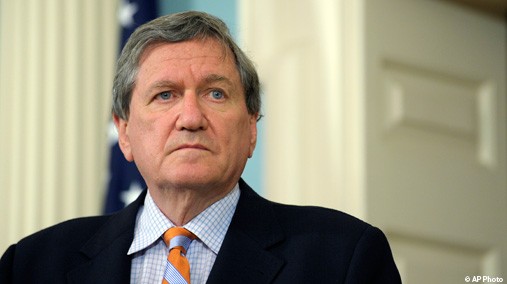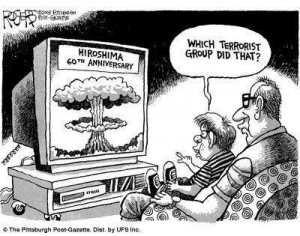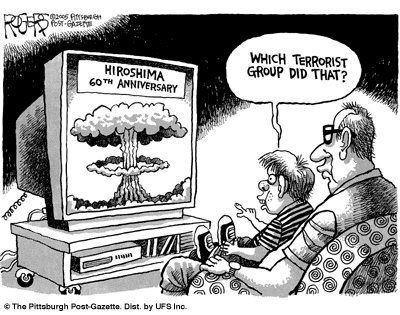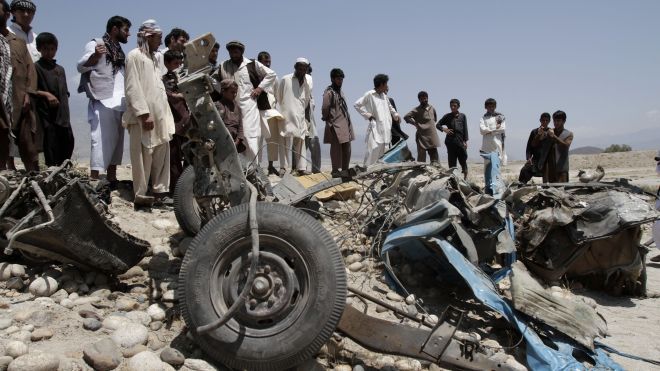
Yesterday would have been uber-diplomat Richard Holbrooke’s 72nd birthday. He died December 13, 2010 while on the job as our top envoy to Afghanistan, and one can’t help thinking that whatever 1960’s idealism still existed in terms of making that country a better place, died with him. At least symbolically.
That is not to say that Richard “bulldozer” Holbrooke wasn’t a strident advocate for the use of military force — he was for sure, and I believe it was only to his and our ultimate detriment. But unlike his neoconservative cohorts in Washington, Holbrooke believed in starting wars (Bosnia, Yugoslavia, Iraq) as a matter of humanitarian intervention, not merely for “securing the realm” or for preserving “western interests.” That is not to say his positions on those wars were any better than those of his neocon peers, it’s merely a distinction, one being that humanitarian interventionists like Holbrooke and Hillary Clinton actually believed American power could transform societies. Neoconservatives, on the other hand, have shown time and again that while they are quite good at breaking things (and regimes), putting Humpty Dumpty back together again was never high on the priority list.
I raise the spirit of Richard Holbrooke now because I heard an old clip of him speaking on P.O.T.U.S Radio on Wednesday, in tribute to his birthday. It referred to the day in 2009 he was named special envoy to Afghanistan and Pakistan, and there were a number of VIPs there to share in what was probably his last true moment in the sun. The radio spot tracked his Associated Press obituary, which noted his early service as a provincial representative for the U.S. Agency for International Development in South Vietnam and then as an aide to two U.S. ambassadors in Saigon during the Vietnam War:
Holbrooke spotted an old friend in the audience, John Negroponte, his one-time roommate in Saigon (the former South Vietnamese capital now called Ho Chi Minh City) who later was the first director of national intelligence and a former U.S. ambassador to Iraq.
“We remember those days well, and I hope we will produce a better outcome this time,” Holbrooke said.
This seems so sad, veering into Shakespearean territory. Here is man who spent his entire life grooming to be in a position to produce “a better outcome” than Vietnam, and then he helps, in essence, to duplicate it, by supporting a military invasion that ripped the fabric of Iraqi society apart and turned nearly every religious and ethnic group against us at some point during the last 10 years . The U.S spent trillions and strained its powerful military and sent millions of Iraqis fleeing — and to what end?
By the time the Bush Administration was on its way out and Holbrooke could have put his diplomatic skills to the test for a Democrat in Afghanistan, the world had unfortunately moved on. The military was everything, not just a means to getting men like Holbrooke to the negotiating table. The new president seemed happy to keep the military on this course, whether that was to hell in a hand basket didn’t appear to matter, as long as the brass got blamed and some kind of deadline for withdrawal could be achieved.
So, after a voluminous career that stretched back to the Kennedy Administration, Holbrooke found himself patronized and later ignored by the young whippersnapper President, who never seemed to let him flex his legendary skills to get the job done for “Af-Pak” the way he had presumably did for the Balkans. Afghan President Karzai appeared to hate him, preferring military men like Gen. Stanley McChrystal, who had gobs of fun at Holbrooke’s expense in 2010, right in front of Rolling Stone reporter Michael Hastings. McChrystal lost his job because of it, but Holbrooke looked very much the weaker man throughout the entire episode.
While there is plenty of anecdotal evidence to suggest that Holbrooke’s own ego didn’t do him any favors (more than once being called a ‘bull in a china shop’), making him as many enemies as friends during his 2009-2010 stint, one thing is clear: the military was (and remains) in control of the entire war and foreign policy effort in Af-Pak. The State Department as Holbrooke had known it was and is a shell of its former self — strangled by the petty bureaucracy at Foggy Bottom, subservient to the military mission, always begging for scraps at the trough.

And the military was — and is — not negotiating. In fact, “negotiation” and “diplomacy” seem like quaint terms these days, right behind “Geneva Convention” and “law of war.” Depending on the “deal” the Obama Administration makes with Karzai for post-2014 military relations, the U.S could likely leave Afghanistan the same way it left Iraq, a country on the brink of disaster.
Holbrooke seems to have sensed this was coming down the road, perhaps staring up at the future from his diminished perch had made him see things more clearly. James Mann, who wrote extensively about Holbrooke for his book The Obamians in 2012, quotes Holbrook’s wife, Katy Marton:
“He thought that this (Afghanistan) could become Obama’s Vietnam,” she said. “Some of the conversations in the Situation Room reminded him of conversations in the Johnson White House. When he raised that, Obama didn’t want to hear it.”
There was even a question over his last words, the first reports being that he told his doctor “to stop this war.” The context in which he said this has been in dispute (his doctor says it was made in “painful banter” as he awaited the surgery from which he never emerged, alive).
It was clear that the humiliation, his isolation, the failure of any way forward in Afghanistan had taken its toll, however, and was foremost on his mind when he collapsed. According to Mann’s well documented account:
On Sunday, Dec. 5, 2010, Richard Holbrooke played tennis on Long Island with Bill Drozdiak, the president of the American Council on Germany, a former foreign correspondent who became friendly with Holbrooke when both were living in Europe. They played for about an hour. Drozdiak thought Holbrooke seemed unusually pale, pudgy and out of shape, as if he’d been working too hard.
Afterward, they sat and talked. Holbrooke said he was in despair over his role in the administration. He simply could not establish a relationship with Obama, Holbrooke said. The president seemed remote and cold-blooded, at least in Holbrooke’s presence. And, as if that weren’t enough, Holbrooke’s problem wasn’t just with Obama: Holbrooke thought many in the White House were against him …
The following Friday, Holbrooke was at a meeting in Hillary Clinton’s State Department office when he suddenly became flushed and stricken with pain. He was taken to the State Department medical office, but collapsed and went by ambulance to George Washington University Hospital. He died there three days later of a ruptured aorta.
What would Holbrooke say today, now that his idea of “humanitarian intervention” has been completely discarded in favor of targeted killing, covert “dirty” wars and yes, a relatively low urgency for the humans themselves. Would he justify it, especially if he were given a prestigious inside view? Should he own it, considering that he and his “muscular Democrats” had set the stage for this evolution in the 1990’s, and had supported Obama’s tough “counter-terrorism” approaches from the beginning?
Daniel Ellsberg suggested in this interesting eulogy after Holbrooke’s death in 2010, that for as idealistic as Holbrooke was, his career came first. Perhaps the daily soul sacrifice working in the Obama Administration — for the scraps of condescension he got in return — was too much for the man. He must have known that the war enterprise was as dirty as it was doomed to failure, but he was committed to defending it nonetheless.
But we will never really know. We can safely say however, that this isn’t exactly the legacy Richard Holbrooke wanted to leave behind. Or this. Or this. In fact, it’s probably worse than he would have imagined.
 President Obama’s #apology tour keeps a-rollin’ on, am I right? No, hang on.
President Obama’s #apology tour keeps a-rollin’ on, am I right? No, hang on.







